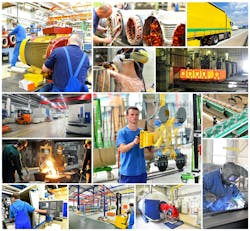Since the term Industry 4.0 was introduced in 2011, industrial companies have been moving in fits and starts towards a vision of connected and secure plants and factories. In this vision, talent and intelligent machines work together with agility to stay ahead of any potential disruption.
More than a decade later, many wonder why has this vision been so hard to achieve? Much of it has to do with the fact that we have been treating the underlying inefficiencies of industrial companies with point solutions, which introduced additional complexity and paradoxically created more problems than they solve. The result is that we have data siloes within siloes.
Connected devices are purchased and never properly inventoried, giving us cybersecurity vulnerabilities. And as industrial workers remain disconnected, production inefficiencies and downtime issues remain.
This is far from the future that we thought we were getting.
To realize the full promise of Industry 4.0, we should be thinking about industrial transformation through the lens of the workflow that connects people, processes and underlying systems. There are two ways that intelligent workflows can accelerate industrial digital transformation:
- Securing your digital estate.
- Digitally empowering your industrial talent.
Workflows to secure your digital estate
In the pursuit of Industry 4.0, manufacturers must prioritize the security and management of their operations technology (OT) systems. Workflows play a crucial role in achieving this by enabling visibility into OT assets and connecting them to business processes. This integration is vital for generating meaningful risk scores and strategically approaching asset risks.
By utilizing advanced workflows, manufacturers can gain a comprehensive view of their OT assets. This visibility is crucial to understanding the interdependencies and risks associated with each asset. Workflows help in mapping these assets to business processes, allowing for a more nuanced understanding of their operational impact and associated risks. With the integration of OT assets into business processes, workflows facilitate the generation of contextual risk scores. These scores are instrumental in prioritizing risks based on their potential impact on the business. This strategic approach to asset risk management ensures that resources are allocated effectively to address the most critical vulnerabilities.
These workflows are not just about identifying and assessing risks; they are also about taking action. They enable manufacturers to kick off automated processes for prompt issue remediation. This proactive stance ensures that any pending issues with OT assets are addressed swiftly, reducing the likelihood of operational disruptions.
Bosch Rexroth stands as a testament to the transformative power of intelligent workflows. As a global leader in manufacturing, they faced the challenge of scaling up automation and enhancing efficiency amid extensive business and technological growth. The key to their success lay in the strategic implementation of workflows, which reshaped their approach to OT management.
The journey began with the integration of multiple functionalities into a singular, cohesive system—a move enabled by the adoption of workflow technology. This integration provided Bosch Rexroth with a unified platform for asset and vulnerability management, along with compliance reporting. Such consolidation brought clarity and consistency, ensuring that every decision was based on a single truth derived from their streamlined OT environment.
But the impact of workflows at Bosch Rexroth went beyond system consolidation. The company was also able to assess the impacts of changes within its complex OT settings. This capability proved crucial in responding swiftly and effectively to incidents, thereby enhancing overall production efficiency. It allowed Bosch Rexroth to maintain a pulse on the health and performance of their systems, ensuring that any modifications or upgrades were executed with minimal disruption and maximum benefit.
Furthermore, in collaboration with ServiceNow, Bosch Rexroth embarked on a multi-year strategic plan to elevate its operational technology. This plan was deeply rooted in the capabilities provided by intelligent workflows, marking a significant step in their digital transformation journey.
Bosch Rexroth's story is more than just an example of adopting new technology; it's a narrative of strategic adaptation and forward-thinking in the realm of Industry 4.0. By harnessing the power of workflows, Bosch Rexroth not only streamlined its processes but also fortified its position as a leader in the manufacturing sector, ready to embrace the future of industrial innovation.
In essence, workflows bring clarity, control and agility to the management of OT systems in the digital factory. By integrating OT assets with business processes and employing intelligent workflows, manufacturers can better secure their digital estate, paving the way for a more resilient and efficient Industry 4.0 environment.
Workflows to digitally empower your talent
In the era of Industry 4.0, digitally empowering talent isn't just about giving workers access to new tools; it's about integrating those tools into a seamless workflow that enhances their decision-making capabilities and productivity. Intelligent workflows serve as the backbone for this integration, connecting disparate systems and providing a unified platform for managing day-to-day operations.
Digital workflows transform the factory floor by providing workers with immediate access to standard operating procedures, compliance checklists and troubleshooting guides, all while ensuring that every action taken is logged for compliance and improvement purposes. This not only streamlines processes but also captures and utilizes the collective knowledge of the workforce, which is especially crucial as experienced workers retire and new talents take their place.
Moreover, these workflows enable real-time collaboration and problem-solving, bringing together remote experts and on-site personnel to address issues promptly. The integration of predictive analytics within these workflows can identify trends and uncover opportunities for continuous improvement, making the manufacturing environment more proactive than reactive.
Take the example of Heineken. Managing the intricate web of machinery within dozens facilities across the world is a formidable challenge. Daily incidents and the need for continual changes created multiple headaches including—most importantly—downtime. To help them, ServiceNow and our partners worked together to build a solution for industrial workers.
The real magic unfolded as Heineken engineers began to leverage the app's capabilities to log incidents, request information and receive guided assistance through multimedia support within the platform. Coupled with iBeacons (an Apple-developed Bluetooth low-energy device that enables mobile devices to determine a device's physical location and trigger location-based actions when in range), the app became an anchor point for relevant data, bringing historical incidents and solutions right to the fingertips of the brewery's stewards. For instance, an engineer addressing an issue with a bottling machine is promptly supplied with a list of potential causes and solutions, derived from a database of similar past incidents. This approach to incident response not only minimizes machine downtime but also supports root cause analysis for long-term resolutions.
By focusing on digitally empowering talent through intelligent workflows, manufacturers can resolve the paradox of increased complexity from point solutions. This approach can unleash the full potential of the digital investments, driving the industrial transformation promised by Industry 4.0.
Embrace the workflow to realize the full promise of Industry 4.0 The journey towards Industry 4.0 is about more than just adopting new technologies; it's about revolutionizing the way we manage and interact with those technologies. Workflows offer a holistic approach to securing your digital estate and empowering talent. They break down data silos, enhance cybersecurity and improve operational efficiency. By embracing intelligent workflows, industrial companies can navigate the complexities of digital transformation, unlocking the full potential of Industry 4.0.
This approach not only streamlines processes but also fosters a proactive, agile and collaborative industrial environment. As we move forward, the integration of intelligent workflows will be key in realizing the promise of a connected, efficient and resilient digital factory.
Karan Srivastava is director of product management and Aswin Mannepalli is global product marketing for manufacturing with ServiceNow.



